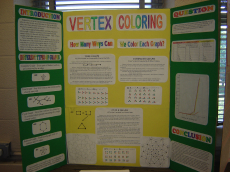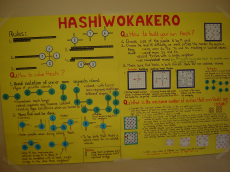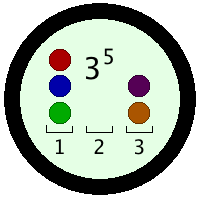Overview:
Working alone or in a group of two, you will research a combinatorial question of your choice and present your findings through a poster. The goals of this project are to apply the techniques we learn this semester to counting questions that arise in the real world and to experience a taste of mathematical research.
If you work in a group of two, you will be responsible for twice as much content than if you had worked alone: your research question will be more involved, your joint poster will be twice the size, and each group member is responsible for both posters.
What will my project be about?
Short answer: Anything you want!
Longer answer: You will come up with a precise project statement that involves a counting question that you choose. The subject can be anything from the real world or an extension of a theoretical combinatorial question that we investigated in class. Once you have one or more initial ideas, Prof. Hanusa will help to make sure your project is of the right scope and feasible to complete in the given amount of time. An important part about your project is that it must involve some original research
If you are having a hard time finding a real-world topic, I suggest brainstorming one or more topics that relate to your interests outside school or work. What do you enjoy doing? What motivates you? What do you love learning about? What is something you always have on your mind? You can use these questions to help narrow down to a specific area of interest. Once you have the subject area, you need to find a related set of discrete objects that you could count or arrange or optimize. If you are having trouble, feel free to brainstorm with your classmates or with Prof. Hanusa. If you come up with multiple ideas, we can work together to refine them into possible questions of interest. If you would like more guidance, feel free to stop by during office hours to chat.
By the due date given below, send me an email with the precise project statement you want to investigate. For example, it might be a question that starts "In how many ways ...".
Deliverables:
You will submit a poster and a one-page reflection essay. You will present your poster during our presentation day. Your poster has two purposes. It serves as a stand-alone record of the work you have done on your project. It also serves as a visual aide that helps you in your presentation to convey to your audience what you learned.
The poster must:
- Include the most relevant parts of your research. You should digest the research you did over the semester and determine the most relevant parts of it. Do not show scratch work or excessive calculations. Instead, summarize the work that you did. Include information about the techniques that you used. All words necessary to understand your subject should be ON the poster. You should expect that your audience has taken our class and has some background in combinatorics. (No need to explain what a generating function is!)
- Present your work in a logical manner. There should be an introduction and your project statement should be explicit. The content should be organized so that anyone looking at your poster can follow along in your reasoning. Do not try to fit too much information onto the poster.
- Present your work in a creative and legible manner. Be creative! Color is encouraged! Create nice visualizations and use them to lead the audience through the content. Their placement will draw the audience's attention. You can write on the poster or glue printed documents to it. The writing should not be too small; the smallest typed font you use should be no less than 20 point.
- Have area approximately 7.5-8 square feet. This is the size of ONE 28"×40" tri-fold board or TWO 22"×28" poster boards.
More details about the reflection essay coming later.
Poster presentation:
During the poster session, you will have 5–8 minutes to present your work to your classmates and to the instructor. You will explain your work, including your project statement and your conclusions. Of more interest to your audience will be the background of your project, the processes you used, and what you found the most interesting during your research. It is also nice to share a question for future work. You should practice this short "elevator pitch" and it may inform you of the best way to organize the material on your poster.
Deadlines:
- Poster topic due: Monday, March 21.
- Revised topic due: Wednesday, March 23. (If applicable.)
- Project due and poster presentations: During scheduled final exam session.
Grading:
This project represents 30% of your grade for the semester. You will be graded on each of the following standards.
- Timeliness and Style:
- Have you met with satisfaction the deadlines associated to the project?
- Did you make continual progress throughout the project window?
- Did you follow the poster format requirements?
- Do you use complete sentences and proper English?
- Thoughtfulness of Research:
- Does the subject level of your project match your level of expertise in the subject?
- Does the project show advancement in your understanding of combinatorics?
- Research Quality: (*)
- Did you explore your project topic in depth?
- Do you use combinatorial methods to solve your question?
- Is the content complete and able to stand alone?
- Is the content mathematically rigorous?
- Poster Clarity:
- Is the poster easy to read and follow logically?
- Is the spacing of the material pleasant?
- Are the key ideas highlighted and easy to process?
- Is your problem statement clearly conveyed?
- Presentation:
- Can you explain to your classmates and to the instructor in a short time the highlights of your research by using your poster as a visual aide?
- Is it obvious that you were organized and had practiced for the presentation?
- Did you arrive on time for everyone else's presentation?
- Reflection Essay:
- More details coming here.
Examples:
What does a finished poster look like? Here are some examples to whet your appetite. These are here to give you an idea of poster presentation; you should come up with your own idea for the project topic.


